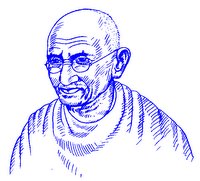
Partition of Pakistan and Hindustan.
Due to partition of Two countries, there are hardly any minorities left in West Pakistan, and already five million inhabitants, including Buddhists and Christians have been forced out of East Pakistan. Discrimination is excersied against minorities in employment, business and rent remittances as a matter of policy, and their immovable properties are requisitioned or acquired by force. They are also subjected to a systematic and discriminatory denial in passport and visa facilities.
No member of a minority can hold the highest office in Pakistan under its present constitution. No Hindu has held any portfolio in the Central Government during the past years, much less responsible appointments in the Police or defence services. No Hindu has held the office of a Chief Justice or a Judge or similar other positions. . Yet there are some eight to Ten million Hindus in Pakistan.
The two nation theory is applied in practice with a vengeance. In other words minorities are suspect. The vicious theory is also being applied to reduce the population of East Pakistan to silence its leaders claim for a special position in Pakistan based on its larger population.
A minority journal “Amar Desh” of East Pakistan in its issue of 3rd September 1964 commented with despair:
If 80 percent people of any country tell the remaining 20 percent that they are a separate nation and they have no ideological or philosophical affinity with them, what is left for the minority but to accept it and organize itself seperayely ? After living together for several years, to-day it is being discovered a new that Hindus and Muslims are separate and under no circumstances can they be identified each other. After the establishment of Pakistan , the minority of community had demanded to be known simply as Pakistan citizens and had wanted only citizenship, constitutional rights and National integration. It has supported joint elections even at its own cost. But today it has become clear that it is impossible to build up a unified nation in Pakistan.
This would suggest that only a Muslim can be a National of Pakistan. Some of them are pushed into Assam, and also to Burma and when evicted by the Government concerned are dubbed as Indian Nationals. The Indian census figures show that they there was overall increase in the percentage of Muslims population in India. Not only could there be no question of Muslims leaving India. Muslims from Pakistan had infact been infiltrating into the surrounding Indian States of West Bengal, Assam and Tirpura in large numbers.
[Hindu desam will continue]














